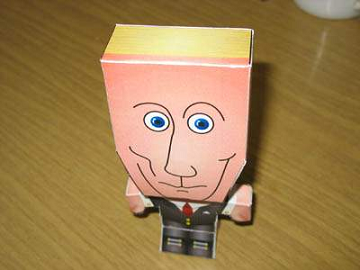Putin is not the master of his country (interview with Leonty Byzov) Leonty Byzov, head of the analytical section of Russia’s state polling agency VTsIOM.
Prague Watchdog: I wonder if you’d care to comment on the political nature of the current regime in Russia? Some describe it as Bonapartist, and maintain that that all the threads of government are concentrated in the hands of one man or a narrow circle of men who stand at the top of the pyramid. In this connection, do you consider it appropriate to make a comparison between the Kremlin system and the regime in Chechnya? Some observers say that the two work in close co-operation, and that the free play between the metropolis and the periphery allows Ramzan Kadyrov to adopt the same model of government and build an unadorned dictatorship, while Putin is compelled to observe certain decencies.
Leonty Byzov: I’d like to emphasize the fundamental differences between the Chechen model and the federal Russian one, though I think that in their index of values Kadyrov and Putin are not that far removed from each other. You could add Lukashenko here, as well. Because the societies Kadyrov and Lukashenko control are smaller and less complex, these two leaders have succeeded in creating Bonapartist regimes. But Putin hasn’t managed that. Putin and the Kremlin leadership have very little real power. And Russia’s political system absolutely rules out the use of political mobilization to meet problems of national security.
Kadyrov really is the master of Chechnya. Likewise, although to a lesser extent, Lukashenko is the master of Belarus. But Putin is not the master of his country. He’s the ceremonial portrait that hangs on the wall of your average government official. The portrait hangs there, but the official acts solely on the basis of his own interests, the interests of his clan. By and large, the question of what Putin gets up to in the Kremlin is a matter of complete indifference to him. And the lives of real people depend on this official, not on Putin's Kremlin.
I think that Putin himself is well aware of his own powerlessness, which has become even more obvious and painful to him since he transferred to the post of Prime Minister. Because when he was President he may have had the illusion that he was the “good Putin” face to face with a “bad government” which might not comply with his instructions. Today he is in the government, and realizes all too well that not very much depends on him.
The country is moving along its own tracks in accordance with the principle of inertia, and it’s extremely difficult to intervene with a plus or a minus, or any indicator at all. Because Russia’s political structure exists only on paper. It’s really all tied up with a system of informal relations. This is also perfectly natural. The break-up of the Russian state which took place from the late 1980s to the first half of the 1990s resulted in the paralysis of all state institutions. They were then replaced by a system of informal institutions and informal relations. And the real power exists only within this framework.
PW: You said that some regional leaders have become the true masters of their territories, in contrast to the rulers in the Kremlin. Could this situation put the issue of the “sovereignization” of the regions on the agenda?
L.B.: When the federal centre weakens and the budgetary options available to it shrink, the centrifugal forces start to revive. I am sure that this is what they will do now. How far will it go? Whether it will lead to real political separatism, or to one that is hidden, it is hard to say in advance. But these trends will manifest themselves, without any doubt.
Photo: muhom.org. (Translation by DM) (P/T)
DISCUSSION FORUM
|

